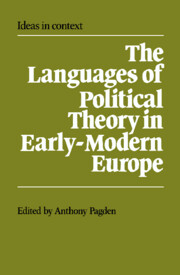Book contents
- Frontmatter
- Contents
- Notes on contributors
- Acknowledgements
- Introduction
- 1 The concept of a language and the métier d'historien: some considerations on practice
- PART I
- PART II
- 6 Sir Thomas More's Utopia and the language of Renaissance humanism
- 7 The concept of ordre and the language of classical republicanism in Jean-Jacques Rousseau
- 8 The language of seventeenth-century republicanism in the United Provinces: Dutch or European?
- 9 The civil religion of James Harrington
- PART III
- PART IV
- Index
- Ideas in Context
6 - Sir Thomas More's Utopia and the language of Renaissance humanism
Published online by Cambridge University Press: 04 September 2009
- Frontmatter
- Contents
- Notes on contributors
- Acknowledgements
- Introduction
- 1 The concept of a language and the métier d'historien: some considerations on practice
- PART I
- PART II
- 6 Sir Thomas More's Utopia and the language of Renaissance humanism
- 7 The concept of ordre and the language of classical republicanism in Jean-Jacques Rousseau
- 8 The language of seventeenth-century republicanism in the United Provinces: Dutch or European?
- 9 The civil religion of James Harrington
- PART III
- PART IV
- Index
- Ideas in Context
Summary
Almost everything about More's Utopia is debatable, but at least the general subject-matter of the book is not in doubt. More announces his theme on the title page, which reads: De Optimo reipublicae statu deque nova insula Utopia. His concern, that is, is not merely or even primarily with the new island of Utopia; it is with ‘the best state of a commonwealth’.
To say that this is More's concern is at once to raise what has always been seen as the main interpretative puzzle about his book. Does he intend us to take the description of Utopia in Book II as an account of a commonwealth in its best state? Are we intended to share and ratify the almost unbounded enthusiasm that Raphael Hythloday, the traveller to Utopia, displays for that island and its way of life?
Until recently More's interpreters tended to answer in the affirmative. One theory has been that More aimed to picture the best state that reason can hope to establish in the absence of revelation. Another suggestion has been that he not only sought to portray a perfectly virtuous commonwealth, but wished at the same time to convey that, in spite of their heathenism, the Utopians are more truly and genuinely Christian than the nominally Christian states of western Europe. While disagreeing on the extent to which More holds up Utopia as an ideal, both schools of thought accept that Utopia must in some sense be regarded as an ideal commonwealth.
- Type
- Chapter
- Information
- The Languages of Political Theory in Early-Modern Europe , pp. 123 - 158Publisher: Cambridge University PressPrint publication year: 1987
- 29
- Cited by



